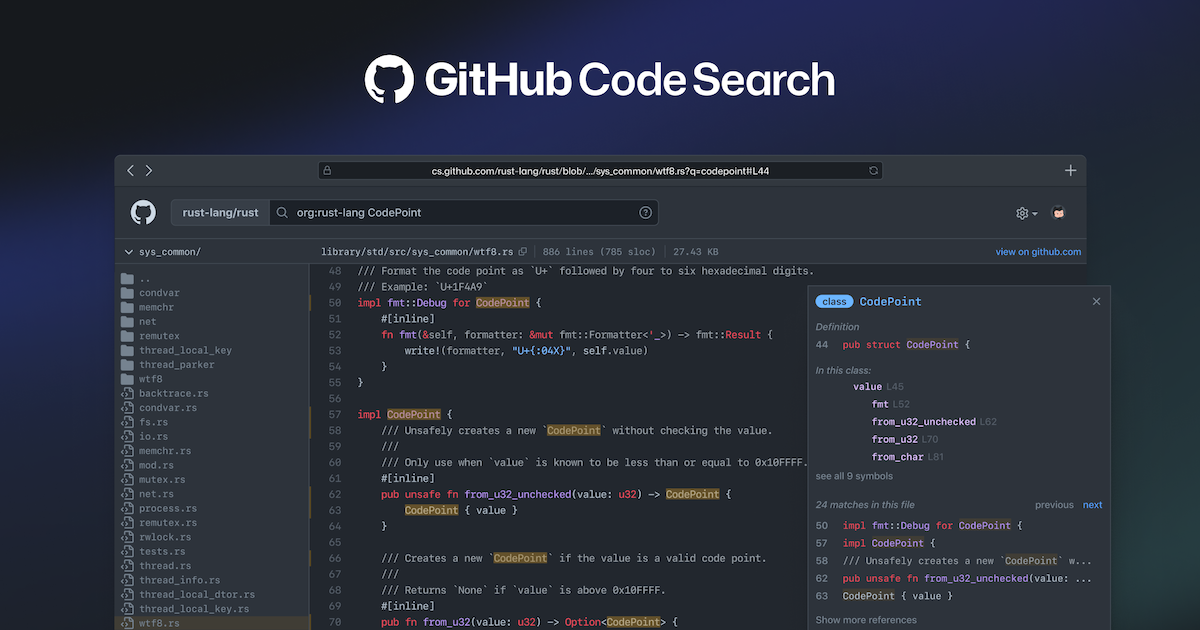Improving GitHub code search
Today, we are rolling out a technology preview for GitHub code search, the next iteration for search, discovery, and navigation on GitHub.

Today, we are rolling out a technology preview for substantial improvements to searching code on GitHub. We want to give you an early look at our efforts and get your feedback as we iterate on helping you explore and discover code—all while saving you time and keeping you focused. Sign up for the waitlist now, and give us your feedback!
Getting started
Once the technology preview is enabled for your account, you can try it out at https://cs.github.com. Initially, we’re creating a separate interface for the new code search as we build it out, but once we’re happy with the feedback and are ready for wider adoption, we will integrate it into the main github.com experience.
At the moment, the search index covers more than five million of the most popular public repositories; in addition, you can search private repositories you have access to. Here are some things to look out for:
- Easily find what you’re looking for among the top results, with smart ranking and an index that is optimized for code.
- Search for an exact string, with support for substring matches and special characters, or use regular expressions (enclosed in
/separators). - Scope your searches with
org:orrepo:qualifiers, with auto-completion suggestions in the search box. - Refine your results using filters like
language:,path:,extension:, and Boolean operators (OR,NOT). Search for definitions of a symbol withsymbol:. - Get your bearings quickly with additional features, like a directory tree view, symbol information for the active scope, jump-to-definition, select-to-search, and more!
The syntax is documented here, and you can press ? on any page to view available keyboard shortcuts. You can also check out the FAQs.
What’s next?
We’re excited to share our work with you as a technology preview while we iterate, and to work with you to find unique, novel use cases and workflows. What radical new idea have you always wanted to try? What feature would make you most productive? Is support for your favorite language missing? Let us know, and let’s make it happen together.
We have no shortage of ideas for what to focus on next. We’ll be growing the index until it covers every repository you can access on GitHub. We’ll experiment with scoring and ranking heuristics to see what works best, and we’ll explore what APIs and integrations would be most impactful. We’ll keep adding support for more languages to the language-specific features. But most of all, we want to listen to your feedback and build the tools you didn’t even know you needed.
The bigger picture: developer productivity at GitHub
As a developer, staying in a flow state is hard. Whenever you look up how to use a library, or have a test fail because your developer environment has diverged from CI, or need to know how an error message can arise, you are interrupted. The longer it takes to resolve the interruption, the more context you lose.
Earlier this year, we launched GitHub Copilot as a technical preview, leveraging the power of AI to let you code confidently even in unfamiliar territory. We also released Codespaces and shared how adopting them internally boosted GitHub’s own productivity. We see our improvements to code search and navigation in the context of these broader initiatives around developer productivity, as part of a unified solution.
For code search, our vision is to help every developer search, discover, navigate, and understand code quickly and intuitively. GitHub code search puts the world’s code at your fingertips: everything is just a search away. It helps you maintain a flow state by showing you the most relevant results first and helping you with auto-completion at every step. And once you get to a result page, the rich browsing experience is optimized for reading and understanding code, allowing you to make sense of unfamiliar logic quickly, even for code outside your IDE.
We plan to share more updates on our progress soon, including deep-dives on the engineering work behind code search and the developers, open source projects, and communities we rely on (special shout-out to @BurntSushi and @lemire, whose work has been fundamental to ours). In the meantime, the number of spots for the technology preview is limited, so sign up today!
Tags:
Written by
Related posts

Unlocking the power of unstructured data with RAG
Unstructured data holds valuable information about codebases, organizational best practices, and customer feedback. Here are some ways you can leverage it with RAG, or retrieval-augmented generation.

GitHub Availability Report: May 2024
In May, we experienced one incident that resulted in degraded performance across GitHub services.

How we improved push processing on GitHub
Pushing code to GitHub is one of the most fundamental interactions that developers have with GitHub every day. Read how we have significantly improved the ability of our monolith to correctly and fully process pushes from our users.